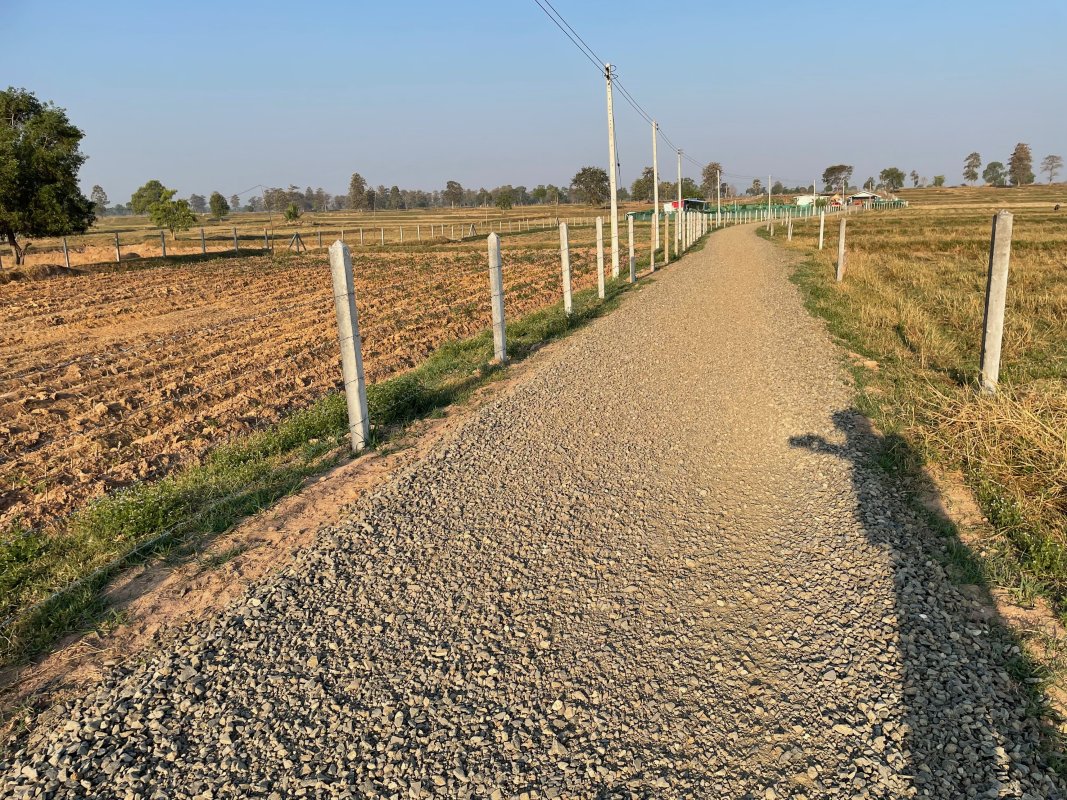Stargazer
Surin Legend
We have about a half km road into the center of our rice fields/lakes. The native sandy clay dries out and turned the road into a sand dune, not a good thing. So I put down about 15cm or so of gravel. Soon the gravel road problem surfaced: it washboards, and the car tire tracks compact. The tractor blade is of limited help, as it won't float as an excavator blade does.
I tried to find a buyable unit to do the job, with no success. In the USA, a box blade is available, but doesn't really do the same job.
To solve this problem, I made a 3 point attachment for our Kubota 5018SP. The 3 point attachment is hard to build without a proper machine shop, so I bought a PPK one made to create furrows for cassava, and removed the discs. I used part of the attachment system and welded a heavy duty extension below. That was the hardest welding, and I had to buff up my heavy welding skills a bit. 3.2mm 7016 rod @ 140A did the trick. Then I hinged 3m long pieces of 2"x4" heavy U-channel steel with ⅝" bolts to the extensions, so the leveler could move and follow the road. Being long is the secret to improving flatness.
Three 2m wide lengths of the same are mounted below at a 45° angle, held in place by 1.5cm square bar welded with 2.6mm 6013 rod at 120A. In order to lift the attachment to turn around, I needed an attachment to the top 3 point that let the leveler float, but then could lift it. My solution was a chain, which is a little slack when the leveler is in a down position.
I can imagine some refinements, but as is, it works pretty well. It is close to as heavy as the tractor can lift. A couple passes with this, and the road is restored to flatness. I suppose we'll dress the road this way several times a year.
3 Point road leveler

I tried to find a buyable unit to do the job, with no success. In the USA, a box blade is available, but doesn't really do the same job.
To solve this problem, I made a 3 point attachment for our Kubota 5018SP. The 3 point attachment is hard to build without a proper machine shop, so I bought a PPK one made to create furrows for cassava, and removed the discs. I used part of the attachment system and welded a heavy duty extension below. That was the hardest welding, and I had to buff up my heavy welding skills a bit. 3.2mm 7016 rod @ 140A did the trick. Then I hinged 3m long pieces of 2"x4" heavy U-channel steel with ⅝" bolts to the extensions, so the leveler could move and follow the road. Being long is the secret to improving flatness.
Three 2m wide lengths of the same are mounted below at a 45° angle, held in place by 1.5cm square bar welded with 2.6mm 6013 rod at 120A. In order to lift the attachment to turn around, I needed an attachment to the top 3 point that let the leveler float, but then could lift it. My solution was a chain, which is a little slack when the leveler is in a down position.
I can imagine some refinements, but as is, it works pretty well. It is close to as heavy as the tractor can lift. A couple passes with this, and the road is restored to flatness. I suppose we'll dress the road this way several times a year.
3 Point road leveler

